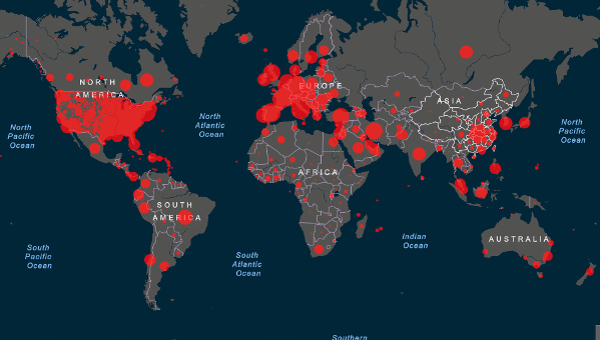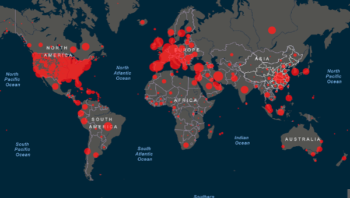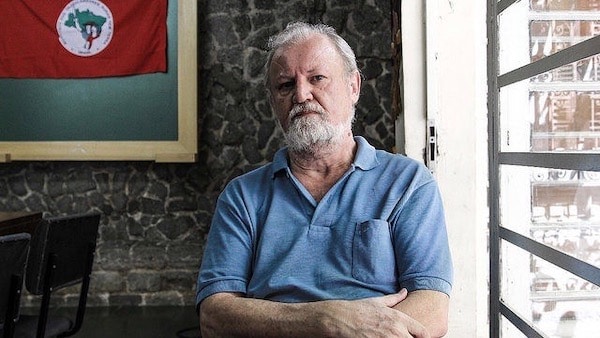In a presentation given last week to nearly 200 militants in Brazil, João Pedro Stedile, member of the National Board of the Landless Rural Workers’ Movement (MST), outlined the key characteristics of the international and Brazilian context. He pointed out that at the international level, the hegemony of the United States is being eroded due to its incapacity to respond to the coronavirus crisis. China, on the other hand, had a swift and effective response to the virus and has now come to the aid of several countries in their efforts to fight COVID-19. China is also consolidating its power economically and politically. He said that this shift, which had already begun before the pandemic, will open up new possibilities to challenge unipolarity in international institutions.
Within Brazil, the coronavirus has pushed the contradictions and internal divisions within the supposedly united Brazilian right, led by Bolsonaro, to the breaking point. Governors who were firmly behind Bolsonaro are in direct opposition to him, and there are splits even within his cabinet.
The Brazilian working class and its various representatives and organizations, Stedile said, despite being stripped of their principal tools of street mobilizations, have come together to form a unified political platform. Organizations have coordinated programs of solidarity across the country in order to alleviate the effects of this crisis on vulnerable populations.
Below is the analysis presented by João Pedro Stedile:
International context
The COVID-19 pandemic is an uncontrollable element in politics, but it has accentuated the economic crisis of global capitalism. It has provoked a situation that questions the fundamentals of neoliberalism and of capitalism itself. The idea that the market resolves everything, which is defended by neoliberals, and that everything is controlled by finance capital and the transnational companies–all this stares at defeat.
Even the three leaders of populist, neofascist governments that positioned themselves against the measures to combat the virus–Boris Johnson in the UK, Trump in the U.S. and Bolsonaro in Brazil–were defeated by the virus. In this context, we can say that we are going to emerge from this crisis, with problems of public health of course, but also with the U.S. empire facing defeat.
The U.S. is being defeated economically because they didn’t prepare (unlike China) to confront this situation. Some reports say that the economy of the U.S. will see a decrease in the GDP by as much as 50%, which would be a huge recession.
They will also emerge from this militarily defeated because in prior crises, they always resorted to military force. It so happens that in this same period, they have had to reach agreements with the Taliban and to leave Iraq and Syria. In these fronts where they had exerted their military power, they ran away with their tail between their legs. The U.S. will emerge from this crisis no longer a great empire. Despite it being a big economy and having military power, it will not be able to use this to forcefully dominate other economies.
We are also seeing the likelihood of Europe being devastated by this crisis. Spain, Italy, and the UK are suffering an unfortunate excessive number of deaths because of the irresponsibility of their governments. Europe will emerge completely demoralized from this episode, in addition to having suffered a high number of deaths.
Petroleum was at the heart of the energy sector. Recently, Vladimir Putin’s moves with respect to Saudi Arabia saw oil prices come to 20-30 dollars a barrel. This revealed the fragility of the big corporations that thought that by controlling the source of petroleum, they could control the global economy. I also believe that we will emerge with new forms of energy. They will of course not completely replace petroleum but this has shown that we need to invest in new forms of energy.
On the issue of finance capital, which is key in the current stage of capitalism, the updates are very positive, for us as workers. We hear a lot of news about the loss of trillions of dollars. The stock market fundamentally, whether it’s NYC or here in Sao Paulo, is just a speculative casino for capitalists, where they try and beat each other out and invest in companies that are giving bigger rates of profit. So they take their stock out of one and run to the other. Marx already described it in Capital as a type of fetish of speculative capitalism. Now, what does this reveal? It reveals that finance capital, with its stocks and companies, has stopped earning billions and has lost their value. Finance capital will emerge from the crisis gravely impacted.
What will happen at the international level after this? These are all speculative hypotheses, but several essays and interviews with important thinkers reflect on the post-coronavirus world. All of them, irrespective of their ideology, seem to believe that while the capitalist mode of production itself will not die of old age or in bed–which is to say, we will only defeat capitalism with the force of the masses–neoliberal capitalism itself has been defeated.
What will emerge after this will depend on the organizational capacity of the workers across the world and the correlation of forces. But we can already identify some elements that characterize the post-coronavirus world.
The first one is the issue of the dollar, its possible that the dollar will no longer be the international currency, and with this this great power of manipulation that the U.S. has will also be taken away that the US.
I also heard that the Chinese Communist Party is circulating a document where it questions the existing multilateral institutions, particularly the unipolarity due to the power of the U.S. in these institutions, such as the United Nations, ILO and other organizations. The document proposes new formats for the functioning of international institutions that reflect the new correlation of forces that will emerge from this crisis, such as the economic power of China.
China will emerge from this crisis with a lot of high morale not only because it preserved its economic primacy but also because it resolved the crisis rapidly, and with a relatively lesser death toll. Also, all the evaluations say that the GDP of China will increase 2-3%. This is not at the same level as before but it will grow nonetheless. And now everyone is desperate and knocking on China’s door for masks, equipment, and this is already a sign that the new hegemonic power in the global economy is China. And this will evidently have consequences for the international organizations, which are the results of the post-World War II order. The international sphere will see great changes after this crisis and in the beginning of next year.
Brazil and economic crisis
As far as Brazil is concerned, what are the principal aspects of the current context from the point of view of the capitalists? First of all, there is a deepening of the economic crisis. All the evaluations point to the GDP falling by 5-20% and so we will enter a period of deep recession. The fact is that until coronavirus passes, the economy will be paralyzed. In the face of the worsening of this economic crisis and of their model, they will try and pass on its burden to the workers, as they did with the crisis in 2014 with Dilma, as they did it later with Temer, and now with the latest provisional measure of the Bolsonaro government as well. Thankfully, the minister was able to put a caveat in this measure that requires the participation of trade unions in negotiations with the companies on the question of employment and salaries, but that is not a definitive decision.
We are also seeing the possibility of some splits with the wiser sections perceiving that if they continue with the policy of extreme neoliberalism of Paulo Guedes (Minister of Economy), they do not have a future. Certain sections of the bourgeoisie have already been making public statements not only against the government and the policies of Guedes but also on the lines that there is a need to think about a new direction for the Brazilian economy.
This is reflected in the bourgeois press too, which is coming out against Bolsonaro although it has yet to critique the economic model. However, just a month ago, we didn’t even have this! So now, the editorial lines of the Globo, Estadão and Folha are clearly anti-Bolsonaro and this begins to take away some political power from him.
Institutional Struggle in Brazil
At the level of the federal government, it seems that god exists, or at least the dialectic. The federal government, led by ‘Captain’ (Bolsonaro), has committed several mistakes in the past couple of weeks, errors that have led to the loss of political credibility.
Bolsonaro, along with Olavo de Carvalho and Trump, have endlessly claimed the virus was created by China, and called it a Chinese virus, idiocies that have backfired. At a time when China’s position is likely to get strengthened, they have decided to declare it as the main enemy.
Bolsonaro has also been launching attacks against governors. Earlier, only one governor in the Northeast, who is from an opposition party, was against Bolsonaro. But now, because of the pandemic, governors across the country have taken up positions against him. This is especially the case with João Doria in Sao Paulo who used to be a staunch supporter of the Bolsonaro government. But that is no longer the case and Bolsonaro has now lost support of all of the governors.
He has also lost the support of a part of the middle class. We have seen people standing by their windows, banging pots and pans in protest. These protests are taking place not just in the periphery but in neighborhoods with tall buildings where a certain section of the middle class lives. It is a good sign that these sections are coming out in protest against Bolsnaro
It is also important to examine the military. We all saw the Commander of the Army call for isolation, and then two hours later, the president went on National News and ridiculed isolation, and called on people to go back to work. So we see that the wiser, or more bourgeois section of the armed forces, is worried and they have in fact gained more control over the public machinery. In certain areas, the internal tension has increased because it is clear that they are placing obstacles on Bolsonaro’s path.
Thus, it is evident that ‘Captain’ Bolsonaro’ can no longer bring together the larger part of the bourgeois forces. However, there is no clear bourgeois force that has the capacity to replace him. This is the dilemma that we are facing now. He has not fallen and there is no alternative. And of course, I’m not speaking about people’s forces, just about the dispute between the different sections of the bourgeoisie.
In this context, as confusion reigns with the ‘Captain’ no longer serving as the hegemonic force or exercising a role of protagonism, the only leadership that he continues to exert is over his social networks. His populist, reactionary, neofascist discourse only caters to his network, which is a maximum of 8% of the population that religiously follows him. This week, a report from the Federal University of Rio de Janeiro revealed that of his millions of followers on Twitter, 55% are bots. This means the illusion of his popularity is maintained and inflated by the algorithms of bots and not because of human followers who are potentially participants in political struggles.
For the bourgeoisie, the best case scenario would be the resignation of Bolsonaro. But they know that it is not in his character to resign and it would take an ultimatum or a decisive move by the armed forces, which does not seem to be happening now. A form of parliamentarianism could emerge, where the Congress takes over governmental activity and decision-making but this too is difficult because its interests are very corporate and the Congress of Brazil does not mirror the forces of the social classes. A process in the Supreme Court is another possibility whereby Hamilton Mourão [the vice-president] could take over. Judging by how the Court has behaved in the past 8 years, they may have the courage to take this step. The last option is impeachment, which would take the longest time and which seems unlikely in this moment of class struggle.
We still have several months of internal struggle within the institutions to see what will happen with the Bolsonaro government and of course, this will depend on the trajectory of COVID-19. If the virus reaches the poor neighborhoods, where there are no public institutions or infrastructure to protect the poor, leading to a rise in the number of deaths, the change in government may take place faster. If the correct policies of the governors regarding isolation work and we are able to avoid high death tolls, we may see the governors exerting more leadership as they are today the principal protagonists of the institutional struggle in Brazil.
Challenges and opportunities of the Brazilian working class
Now, let us look at the working class, which is the counterweight in the balance of the class struggle. The working class, however, is stuck, scared and without capacity to act in the current political context because it does not have its instruments like strikes and street mobilizations. The working class is thus left without possibility to express itself and its political will and force. So with this complex scenario, organized sectors of the class have been conducting virtual meetings.
The organized sectors have created a single political platform, which was an important step because in the first week of the quarantine, there were probably 100 manifestos from all the different sectors. Finally, last week, we were able to build a unitary platform with all of the movements that are part of the two fronts–People’s Brazil Front and People Without Fear- all the Central Trade Union Federations, the churches which form a new component and people’s movements in general. So now we have an important platform of unity. We know what we want to not only confront the immediate COVID-19 emergency but also in terms of economic policy to deal with the post-COVID-19 moment.
We are also building, in all possible ways, actions of solidarity. What is the nature of this solidarity? First as a principle, because we have to emerge from this crisis with this value that only the working class is able to cultivate, which is solidarity between human beings. The practice of solidarity today is fundamental for us to build what will come after the crisis and what will be the new paradigms for us to defeat capitalism. Here, we have several initiatives that the working class across Brazil has taken up. There is the solidarity of talking to neighbors, seeing how people are doing, the youth helping out with grocery shopping etc. There is also the solidarity of the food baskets, the solidarity of donating blood, in which across the camps and settlements of the MST, people are participating. I was overjoyed to see recently that one of the facilities of the Corinthians soccer team has been converted into a blood donation centre where fans can go and help out. There are many initiatives, some of which are organized and some of which are spontaneous. As movements, we must encourage all types of solidarity possible.
Thirdly, we must be creative in agitation and propaganda. Now is the time to denounce that it is not just the virus, it is capitalism! It is the Captain (Bolsonaro)! It is the neoliberal policies! So we have many arguments to engage in agitation. We have many arguments for propaganda too, regarding who and what should replace him, whether it’s a short-term political platform or our anti-capitalist discourse. Now for this, we need to be much more creative because the traditional forms of agitation and propaganda, the bulletins and newspapers, are no longer very relevant with the stay at home order. So we need to use more of the internet, radio, the TV. We are trying to build a national network of these media projects.
We also need to highlight the figure of Lula. Lula is the principal people’s leader of this country, and he has a very important seat at the table. He has a microphone, and he must use this microphone in an organized way to speak to the masses, and to take to the masses the denouncement of what is happening now and the announcement of what needs to be changed.
Both the People’s Brazil Front and the People Without Fear Front joined the ‘Fora Bolsonaro’ (Out With Bolsonaro) campaign. But many State leaders of the MST suggested and supported the idea of proposing something too, something positive, such as “In defense of life and the people…Out with Bolsonaro” or “In defense of the Brazilian people…Out with Bolsonaro.” Others added that it’s not enough to demand that Bolsonaro alone leave as we are opposed to all the people who are part of the system in the Palace of Planalto [the office of the president of Brazil]. So they suggested the slogan “Out with the Bolsonaro Government.”




